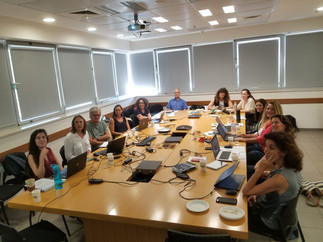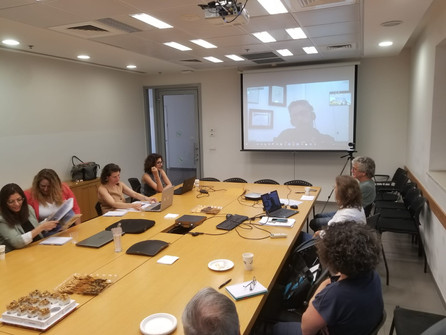We wish to thank everyone who participated in the 2nd Consortium Meeting which was held both online and on-person from 15/06/2021 until 17/06/2021. Special shout-out to the partners who were able to meet us in person at The Academic College of Tel Aviv Yaffo! We really hope to have the opportunity to host all our partners here but hopefully, we will be able to do so in our 3rd Consortium Meeting.
In addition, we would like to thank our guest speakers: Prof. Eilon Vaadia, MTA's Vice President, and Ms. Naama Levi, Project Manager, Israel National Erasmus+ Office. Special thanks to the keynote speaker Dr. Liad Ortar for his fascinating lecture "The Race to Net-zero: the role of business in fighting Climate Change"
1st Day
Eilon Vaadia from the Academic College of Tel Aviv-Yaffo spoke about the importance of the project to MTA and how he sees the project integrating into the various areas of activity of the college.
We listened to Dr. Liad Ortar fascinating lecture on "The Race to Net-zero: the role of business in fighting Climate Change". A very interesting lecture that led to a noteworthy discourse about what it really is "Net-zero", does it work as it sounds, how to better monitor it, etc.
Overview of each WP: the progress we have done so far, future plans & meetings. More information via this link
Dissemination Workshop - we reviewed the channels we currently distribute the project and discussed additional channels through which we can disseminate our work on the project. in order to generate an initial buzz regarding the program, we divided the participants into small groups. Each group was required to think of a cool/interesting post to post on social media, tagging the program (#IFI).
We had a monitoring session with Ms. Naama Levi, Project Manager at the Israel National Erasmus+ Office
2nd day
*Survey Review: We started with a review of the analysis of the Student's, Non-Academic's & Faculty's surveys results.
1. Students: Vered, presented the analysis of the two surveys (Hebrew & English) while comparing their results.
In total, 1511 students participated in this survey. 555 from Israel and 956 from Europe. Most of them were either 25-30 (Israel) or 18-22 (Europe). In total, 66.6% were Bachelor students and mostly from either Social Sciences, Management & Economics or Engineering & Technology departments.
Regarding the question of familiarity to the term "Sustainable finance" - It seems that they are either slightly familiar or not familiar at all with this term.
It seems that a major group of our participants aren't involve in sustainability activities at all, both off-campus and on-campus (Reported "none" regarding the participation in courses: Israel, ~45%; Europe, ~27%)
On the other hand, it seems that they understand the importance of sustainability and impact and they do wish that there were more opportunities; both off-campus (I.e., career, internship, etc.) and on-campus (courses).
A question arose regarding the courses they reportedly attended - are these courses compulsory or optional courses?
Volker proposed comparing the level/amount of volunteering and social involvement in relation to sustainability activity so we could get a broader picture of the situation.
You can find the full detailed presentation via this link
2. Faculty - Volker presented the analysis of the faculty survey (N=83)
Regarding sustainability, it seems that the majority of the participants agree that:
- The main academia relevant fields of contributions are either " Basic (fundamental) research" (63.4%) "Curricular education" (61%)
- Academia serves as a place of knowledge (~88%)
- Knowledge production, education, and transfer (Academic activities) is the most priorities approach to which they expect the greatest contribution in solving these problems (77.11%)
- Personal value and engagement is the most relevant incentive to work on societal challenges (68.67%)
- Either "Education/ qualification demand" (66.3%) or "New funding opportunities" (54.2%) would strongly serve as encourage for academic involvement in sustainable and impact finance issues in general
You can find the full detailed presentation via this link
3. Non-Academic – Yifat presented the analysis of the Non-Academic's survey (N=73)
Sample: Professionals from the fields of investments, regulation, management, and consultancy. Mostly men, majority of them work in the finance sector. Proportional representation between the participated countries.
The initial survey shows that Impact and/or ESG investment are still considered risky. In addition, it shows that there is still no sense of urgency on the climate and social-related financial disclosure
Profitable responsible investing is still considering investing in the environment, then in social and governance. Yet, we saw less focus on philanthropy and CSR and raising understanding to the need
Two strong trends were identified: a dichotomy between society and the environment, and a clear gap between statements, perceptions, and actions, understanding, and implementation.
The gap between the declaration and actual investment might be explained by the search for proof of concept (PoC). PoC also corresponds with the need for more successful case studies of responsible finance and investments
regarding the role of academia, answers pointing towards the move to quantity measurements, and indicating the hope academia will focus on:
1. Building metrics & standards
2. Education as mostly measurements and index training
3. success stories (PoC): Looking for market evidence through success stories, capacity building for investees and standards for impact measurement as core strategies to develop the market
in conclusion, there is still a strong inwards impact mindset: excessive focus on impacts inwards (risk to the company) then to impacts outwards (risk by the company)
- No innovation – new forms of investing, lending, regulation (Fiduciary duty), and perspectives
- No sign of transition management or integrated thinking
You can find the full detailed presentation via this link
*Following that, we discussed the "Task Forces" - what their continued work would look like and how to maximize their efficiency in the face of limited resources due to additional WP work demands.
Vered suggested that the Task Forces work should be focused on meeting the needs/requirements of each target group (Students, Faculty, Non-academics). Accordingly, she suggested dividing the Task Force by these target groups and suggested that they will work closely with the rest of the WP to see how and where we can contribute and develop the relationship with those groups and involve them within our project.
*Following that we review all administrative aspects of the management of the project. Detailed presentation Link
*General Assembly:
Attendance at meetings - at least one representative from each institution participates in the various work meetings
Financial reports – reporting duration changed to once every two months. Vered proposed to arrange a 1-on-1 meeting with Sahar (IFI Administrative Manager) after preparing the initial financial report draft, so they could go over it together before signing. The partners agreed with this proposal
Distribution of e-mails - Vered raised the question of whether it would be preferable for bulk e-mails to be forwarded first to the institutional contact and they will choose whom to pass the information to, or should we continue to distribute it to all partners as we do. It was unanimously decided to continue the existing situation.
Newsletter – Vered emphasized the importance of reading through the newsletter
Vered referred to the fact that the project officer approved an extra visit between the Israeli & European partners. To promote partnership and the various WP tasks in which they are engaged, each Israeli institution will contact and schedule a visit to a European partnered institution. After coordinating, the institutions must inform the project management team regarding the purpose of the meeting and the task/subject they are planning on working.
Dirk emphasized the importance of incorporating external guest lectures into our formal project meetings. In addition, he noted that it may be worthwhile to try and find a guest lecturer who understands the field of integrating lecturers in the world of impact to help promote the changing of mindset towards this field.
3rd day
We had one-on-one meetings with each one of the partner institutions to discuss open issues and clarify all aspects related to the project. we discussed the work packages that each partner is either taking part in or responsible for, a possible incorporation between that WP and other WP, administrative issues such as the state of financial reporting, inquiries about arriving WP6 meeting in Spain several weeks from now, etc.
The purpose of the meeting was also to hear from the various partners their opinions on the work packages, where and how they can be promoted, what things might be worth adding/changing, etc.
.png)
![eu_flag_co_funded_pos_[rgb]_right - נערך.png](https://static.wixstatic.com/media/41285d_c1a5230f108e44328bdfd4bd970b39af~mv2.png/v1/crop/x_0,y_1,w_1600,h_454/fill/w_297,h_84,al_c,q_85,usm_0.66_1.00_0.01,enc_auto/eu_flag_co_funded_pos_%5Brgb%5D_right%20-%20%D7%A0%D7%A2%D7%A8%D7%9A.png)




















Comments